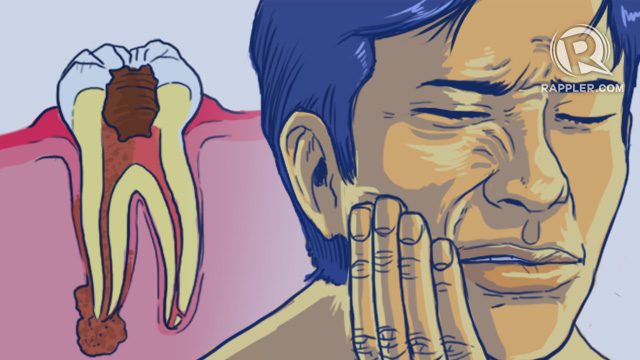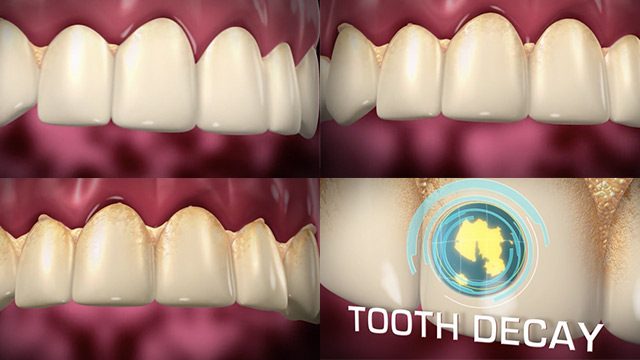SUMMARY
This is AI generated summarization, which may have errors. For context, always refer to the full article.

MANILA, Philippines – The most common oral diseases are easily preventable.1 But due to lack of awareness and information on how to avoid them, poor oral health remains prevalent among Filipinos.
When a tooth and gums begin to throb, it is usually left alone in order to save a trip to the dentist. But when the pain becomes unbearable, a much bigger problem has now begun.
A toothache is just the tip of the iceberg. It can be a symptom of tooth decay and requires professional help.
Tooth decay is considered to be one of the most prevalent oral health problems worldwide. 2 According to Carina Mabanta-Delos Reyes, Chair of the UP College of Dentistry Centennial Advocacy Committee, the Philippines has one of the highest rates of caries or cavities in the world.
Though everyone is susceptible to getting dental caries, 59.4% of Filipinos have never been to a dentist and 20% of 6-year-olds suffer from toothaches but still don’t receive professional care from dentists. It is also cited as the most common cause of absence in school and work among Filipinos.
What is the root cause?
The consumption of food and drinks high in sugar, not brushing after meals and missing dental appointments only contribute to oral health problems. Knowing the root cause of it will help prevent future dental caries and toothaches that can disrupt daily schedules.
The main culprit of oral diseases is plaque. It is a colorless substance made of bacteria that form in the nook and crannies of teeth and gums. (READ: When plaque attacks). The left-behind plaque can slowly eat away the three layers of the teeth: the crown or the outermost layer, which is covered with enamel, the dentine, and the pulp or the innermost layer, which also protects the nerves and blood vessels.

This can cause tooth decay and gum problems that are often accompanied with toothaches, which warn you of a more serious problem ahead. When the pulp gets inflamed, the pain cannot be easily ignored and a visit to the dentist should be under way.
Not everyone is aware that poor oral hygiene, in terms of accumulating plaque and increasing age, are experienced among the youth and adults in developed and developing countries, yet promotion of preventive measures are ineffective.3 This has been proven by the data on the prevalence of oral diseases.
This shows that awareness and being informed of the importance of oral health is key to avoid plaque build-up leading to dental caries, bad breath, inflamed gums and other oral diseases. Taking action at the onset of a toothache can no longer do. By then it could be too late to save your tooth.
The solution
Even by following a strict dental regimen, tooth decay may still be experienced. This is caused by not using the right kind of toothbrush as well as incorrect brushing technique.
Switching to a more efficient toothbrush is a simple solution. Angled bristles can do the job that other brushes can’t, which is to remove the plaque in hard to reach places. Plaque left behind after brushing can cause tooth decay and other problems like bad breath and swollen gums. This is why it is important to be more discriminating when it comes to the toothbrush you use.
Flat-trimmed brushes can clean teeth, but because they can’t get in between teeth, why not use the right toothbrush that can do a more efficient job?
Being informed of preventive measures and being aware of how important oral health is will also help in reducing oral diseases. Brushing after meals, going to the dentist annually for prophylaxis and flossing are some good practices to follow to avoid plaque build up and maintaining good oral health. – Rappler.com
REFERENCES:
[1] Bourgeois, Denis, Prathip Phantumcanit, Juan Carlos Llodra, Virginie Horn, Monica Carlile, and Jean-Luc Eisele. “Rationale for the Prevention of Oral Diseases in Primary Health Care: An International Collaborative Study in Oral Health Education.” International Dental Journal 2014 64.0020-6539 (2014): 1-11. Print.
[2] Bourgeois, Denis and Juan Carlos Llodra. “Global burdenof dental condition among children in nine countries participating in an international oral health promotion programme 2012-2013.” International Dental Journal 2014 64.0020-6539 (2014): 27-34. Print.
[3] Llodra, Juan Carlos, Prathip Phantumcanit, Denis Bourgeois and Virgie Horn. “LLL2: An International Global Level Questionnaire on Toothbrushing and Use of Fluoride Paste.” International Dental Journal 2014 64.0020-6539 (2014): 20-26. Print.
Add a comment
How does this make you feel?
There are no comments yet. Add your comment to start the conversation.